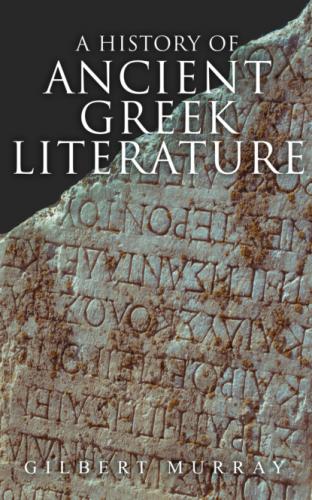Gilbert Murray
A History of Ancient Greek Literature
Complete Edition
e-artnow, 2021
Contact: [email protected]
EAN 4064066498924
Table of Contents
II LESSER HOMERIC POEMS; HESIOD; ORPHEUS
III THE DESCENDANTS OF HOMER, HESIOD, ORPHEUS
VII PHILOSOPHIC AND POLITICAL LITERATURE TO THE DEATH OF SOCRATES
XVII DEMOSTHENES AND HIS CONTEMPORARIES
XVIII THE LATER LITERATURE, ALEXANDRIAN AND ROMAN
PREFACE
To read and re-read the scanty remains now left to us of the Literature of Ancient Greece, is a pleasant and not a laborious task; nor is that task greatly increased by the inclusion of the 'Scholia' or ancient commentaries. But modern scholarship has been prolific in the making of books; and as regards this department of my subject, I must frankly accept the verdict passed by a German critic upon a historian of vastly wider erudition than mine, and confess that I 'stand helpless before the mass of my material.' To be more precise, I believe that in the domain of Epic, Lyric, and Tragic Poetry, I am fairly familiar with the researches of recent years; and I have endeavoured to read the more celebrated books on Prose and Comic Poetry. Periodical literature is notoriously hard to control; but I hope that comparatively few articles of importance in the last twenty volumes of the Herines, the Rheinisches Museunt, the Philologus, and the English Classical Journals, have escaped my consideration. More than this I have but rarely attempted.
If under these circumstances I have nevertheless sat down to write a History of Greek Literature, and have even ventured to address myself to scholars as well as to the general public, my reason is that, after all, such knowledge of Greek literature as I possess has been of enormous value and interest to me; that for the last ten years at least, hardly a day has passed on which Greek poetry has not occupied a large part of my thoughts, hardly one deep or valuable emotion has come into my life which has not been either caused, or interpreted, or bettered by Greek poetry. This is doubtless part of the ordinary narrowing of the specialist, the one-sided sensitiveness in which he finds at once his sacrifice and his reward; but it is usually, perhaps, the thing that justifies a man in writing.
I have felt it difficult in a brief and comparatively popular treatise to maintain a fair proportion between the scientific and æsthetic sides of my subject. Our ultimate literary judgments upon an ancient writer generally depend, and must depend, upon a large mass of philological and antiquarian argument. In treating Homer, for instance, it is impossible to avoid the Homeric Question; and doubtless many will judge, in that particular case, that the Question has almost ousted the Poet from this book. As a rule, however, I have tried to conceal all the laboratory work, except for purposes of illustration, and to base my exposition or criticism on the results of it. This explains why I have so rarely referred to other scholars, especially those whose works are best known in this country. I doubt, for instance, if the names of Jebb, Leaf, and Monro occur at all in the following pages. The same is true of such writers as Usener, Gomperz, Susemihl, and Blass, to whom I owe much; and even of W. Christ, from whose Geschichte der Griechischen Litteratur I have taken a great deal of my chronology and general framework. But there are two teachers of whose influence I am especially conscious: first, Mr. T. C. Snow, of St. John's College, Oxford, too close a friend of my own for me to say more of him; and secondly, Professor Ulrich von Wilamowitz-Moellendorff, of Göttingen, whose historical insight and singular gift of imaginative sympathy with ancient Greece seem to me to have changed the face of many departments of Hellenic study within the last fifteen years.
My general method, however, has been somewhat personal, and independent of particular authorities. I have tried -- at first unconsciously, afterwards of set purpose -- to realise, as well as I could, what sort of men the various Greek authors were, what they liked and disliked, how they earned their living and spent their time. Of course it is only in the Attic period, and perhaps in the exceptional case of Pindar, that such a result can be even distantly approached, unless history is to degenerate into fiction. But the attempt is helpful even where it leads to no definite result. It saves the student from the error of conceiving 'the Greeks' as all much alike -- a gallery of homogeneous figures, with the same ideals, the same standards, the same limitations. In reality it is their variety that makes them so living to us -- the vast range of their interests, the suggestiveness and diversity of their achievements, together with the vivid personal energy that made the achievements possible. It was not by 'classic repose' nor yet by 'worship of the human body,' it was not even by the mere possession of high intellectual and æsthetic gifts, that they rose so irresistibly from mere barbarism to the height of their unique civillsation: it was by infinite labour and unrest, by daring and by suffering, by loyal devotion to the things they felt to be great; above all, by hard and serious thinking.
Their outer political history, indeed, like that of all other nations, is filled with war and diplomacy, with cruelty and deceit. It is the inner history, the history of thought and feeling and character, that is so grand. They had some difficulties to contend with which are now almost out of our path. They had practically no experience, but were doing everything for the first time; they were utterly weak in material resources, and their emotions, their 'desires and ftars and rages,' were probably wilder and
